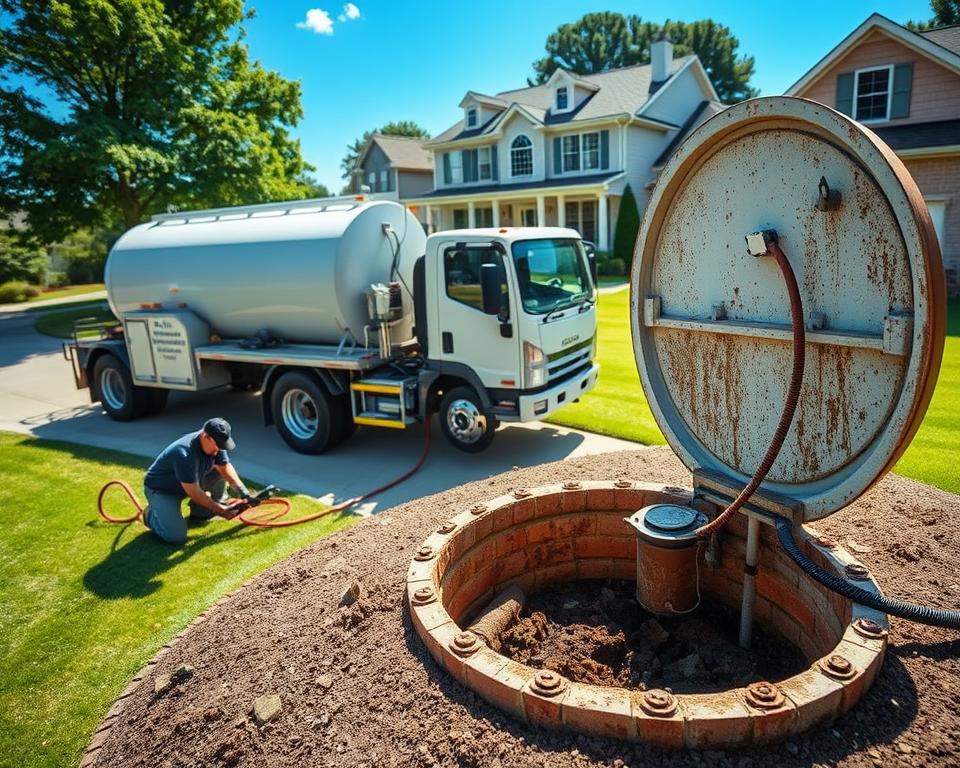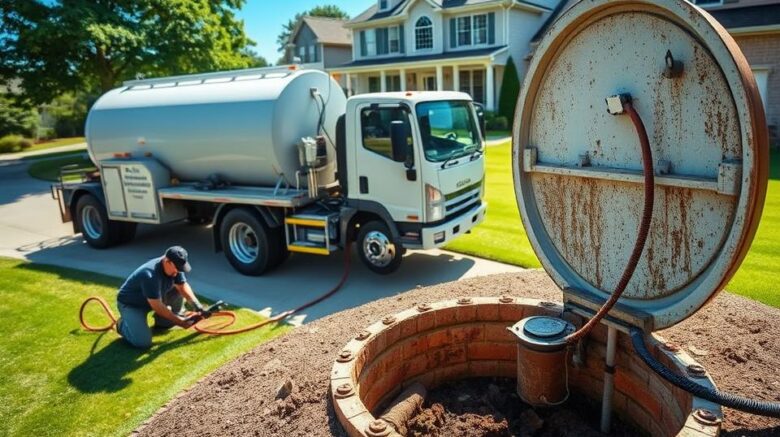Pumping Your Septic System
Ever pondered how often you should schedule septic system pumping to avoid costly malfunctions? With over 20 percent of U.S. households using septic systems, understanding their maintenance is essential. Knowing precisely when to book a septic tank service is key to its lifespan. In addition, there are affordable septic pumping options that provide top-notch functionality minus the big price tag. Below, we outline critical upkeep recommendations useful for every homeowner.
Essential Conclusions
- Scheduled septic system pumping is crucial for optimal operation.
- Spotting the indicators that show the need for service can head off major issues.
- Choosing professional septic system pumpers secures quality maintenance.
- Affordable septic pumping options are accessible for homeowners.
- Routine inspections promote peak system performance.
Getting to Know Your Septic System
A septic system plays a crucial role in processing household wastewater, comprising several important components that work collectively. The main drain line conveys wastewater from your home to the septic tank, where the process initiates. In the tank, an underground chamber, solids settle at the bottom, and bacteria break down these solids, cleaning the waste effectively.
The treated liquid discharge then moves from the septic tank to the distribution box, where it is distributed evenly across the drain field or leach field. Here, the soil continues the filtration, further purify the wastewater. Understanding the functions of these septic system parts is essential. It allows homeowners to supervise and upkeep their systems properly.
Understanding how your septic system functions helps you implement proactive maintenance measures. It’s beneficial to have regular check-ins with licensed cleaners of septic systems – septic tank service near me. They offer crucial insights for best functioning of your system. These professionals aid in arranging the essential pump-outs and checks. This proactive approach can considerably extend your septic system’s lifespan.
Why Septic System Maintenance Matters
Caring for your septic tank consistently is pivotal for homeowners who want their system to remain reliable. A well-cared-for system offers peace of mind and safeguards your property’s value. Without proper care, you’re facing system breakdowns and health dangers.
Opting for a top-notch septic pumping service is essential. They provide timely inspections and pump-outs, removing sludge and scum buildup. If maintenance is neglected, urgent pumping may be required, which is expensive.
Following a regular maintenance plan is wise. It includes professional evaluations and regular pumping. This preventative measure prevents urgent issues, creating a more secure living environment for everyone.

Warning Signs for Septic Systems
Staying mindful of septic system issues can sidestep expensive repairs and major damage. Typical signs show when your system demands a check. These include:
- Slow drains throughout the house
- Pooling water in the yard above the drain field
- Bad odors near the septic tank or leach field
- Unusually green grass growth in particular areas of your yard
These clues could indicate problems that might lead to your system failing. Acting quickly is vital. Contacting septic pumping specialists for an inspection aids. Timely action prevents minor issues from turning into large ones. Additionally, routine upkeep ensures your system works well and has a longer life.
Best Practices for Septic System Pumping
Correct pumping of your septic tank is imperative to sidestep hefty clogs and backups. It’s vital to establish the appropriate schedule for maintenance. Homeowners should typically plan pumping every 2 to 5 years, based on the tank’s size and household wastewater levels. Frequent use of garbage disposals may require more frequent pumping.
Engaging professional pumpers guarantees your tank gets a complete clean and check-up. During pumping, specialists look for any issues, such as faulty baffles. Detecting these problems promptly avoids costlier expenses and inconveniences later. Scheduled pumping schedules and expert help provide your septic system’s smooth operation.
Routine Inspections for Optimal Performance
Routine inspections are essential for your septic system’s performance. Septic system inspections reveal early issues before they grow. Experts advise inspections every three to five years, influenced by system size and household usage. This avoids costly fixes.
Keeping maintenance records is vital for monitoring your system’s condition. These records offer insights into previous inspections, repairs, and suitable intervals to schedule septic tank cleaning services. With this information, preparing for future upkeep becomes more straightforward, maintaining septic systems in optimal shape.
Consistent inspections and detailed record-keeping not only improve system efficiency but also prolong its life. This approach safeguards the environment and the investment in a safe, operational home.
| Inspection Type | Recommendation Frequency | Benefits |
|---|---|---|
| Visual Inspection | Annually | Identify surface issues |
| Professional Inspection | Every 3–5 years | Assess functionality and detect problems |
| Septic Tank Pumping | Every 3–6 years | Prevent overflow and system failure |
Using Water Wisely to Improve Septic Longevity
Smart water use is essential for keeping your septic system sound. It not only supports the environment but also improves the performance of your home’s plumbing. By practicing simple, yet effective, conservation methods, homeowners can cut down on wastewater.
Spread out your laundry activities over the week instead of running back-to-back loads. This allows the septic system to handle water better and prevents tank overflow. Opting for low-flow fixtures in your kitchens and bathrooms yields considerable water savings, maintaining the water pressure up while cutting the flow rate, thus trimming the amount of wastewater produced each day.
Promptly fixing leaks is another method to help your septic system. Even a small leak can result in a large waste of water, overburdening the septic system. Through regular inspections and repairs, you contribute significantly to the system’s efficiency.
Emphasizing water conservation isn’t just beneficial for your septic system; it’s also a step towards environmentally responsible living. Integrating such practices a part of your lifestyle helps both your household and the planet.
Proper Handling of Household Waste
Homeowners hold a vital role in keeping their septic system’s health by handling household waste correctly. It’s essential to avoid disposing of non-biodegradable items like wipes, plastics, and other hazardous products in the system. These items can cause clogs, leading to pricey repairs and a drop in efficiency.
Composting food scraps and organic materials is a helpful alternative to disposing of them conventionally. This practice significantly cuts down on the amount of solid waste entering the septic tank. Prioritizing biodegradable waste disposal preserves the ecological balance needed for effective waste management.
It’s vital to watch what goes down the drains. Non-decomposable items can necessitate more frequent septic tank pumping. By grasping and following correct waste disposal methods, you can ensure a more efficient and long-lasting septic system.
Safe Cleaning Products for Your Septic System
The health of your septic system depends significantly on your choice of cleaning products. Selecting septic-safe cleaning products is crucial. These products shield the balance of beneficial bacteria that digest waste. Many standard cleaners include harmful chemicals that jeopardize this balance, resulting in pricey repairs or system failure.
Homeowners should consider natural alternatives that are both effective and environmentally friendly. Common household items like baking soda, vinegar, and lemon juice are superb choices. These natural cleaners are not only good at cleaning but also support your septic system’s health.
Avoiding products that contain antibacterial agents and chlorine bleach is vital. Such substances destroy the beneficial good bacteria, weakening your system’s functionality. By picking sustainable products, you secure both the efficiency and longevity of your septic system.
The Role of Bacteria in Your Septic System
Bacteria carry out a vital role in keeping your septic system healthy. They decompose solids on their own and boost nutrient processing. A lack of healthy bacteria can trigger system failure, bringing about hefty repairs.
Homeowners can bolster their system by introducing organic additives. These products boost beneficial bacteria, making waste decomposition more effective. It’s important to select organic additives that are helpful, not harmful, to the septic environment.
A robust bacterial community is key to a septic system’s longevity and efficiency. It stops solid buildup and reduces the need for repeated pumping. Focusing on bacterial health ensures waste management more effective and eco-friendly.
To Conclude
Septic system care is vital for the durability and functionality of your home’s wastewater system. Sticking with essential maintenance tips sidesteps expensive repairs. Grasping routine pumping and inspections is paramount. This guarantees your septic system remains in excellent condition.
Learning about your septic system’s operation and proper methods in water and waste management is crucial. Engaging professionals like All in Sanitation delivers expertise. This supports your septic system’s long-term health and gives peace of mind.
Putting effort into proper septic maintenance today delivers future benefits. It protects your home and enhances your family’s quality of life. Emphasizing septic system care provides certainty with a well-maintained system.
